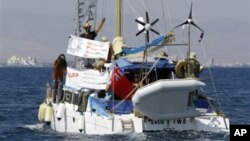Immediately after Turkey's elections in June, senior Turkish and Israeli diplomats met in what analysts say is the first step in efforts to rebuild relations.
Those efforts could be further boosted by easing of bilateral tensions between Ankara and Washington and a possible coalition government in Turkey, but formidable obstacles remain.
Since the 2010 Israeli commando killing of nine Turkish citizens trying to break Israel's economic blockade of Gaza, relations between Ankara and Tel Aviv have been frozen. Washington has been working hard to rebuild relations between its two key allies in the region. Those efforts had been hampered by its own strained relations with Ankara over differences in fighting the Islamic State militant group.
But with many of those differences now resolved, Semih Idiz, political columnist for Turkey’s Cumhuriyet newspaper and Al Monitor website, said Washington will be looking to build on tentative diplomatic steps taken to restore relations between its allies.
"Part of this rapprochement is the dialogue that is going on between Turkey and Israel; I think Washington is taking a broad look not just in terms of ISIS,” he said. “Immediately after the elections, we had reports Turkey and Israel were talking here and there to try and normalize relations."
Observers say restoring Israeli and Turkish relations could help Washington’s efforts to balance Iran’s growing influence in the region. Ankara shares its close allies Qatar and Saudi Arabia’s concerns about an emboldened Tehran following a nuclear deal that is set to lift many Iranian sanctions. But international relations expert Soli Ozel of Istanbul’s Kadir Has University said there remain considerable domestic obstacles to any thawing in Israeli-Turkish relations.
"Because of the very ideological trend the Turkish foreign policy has taken and because of the very bad chemistry between the Israeli and Turkish prime ministers all the efforts to kind of normalize relations have failed," Ozel said. "On the other hand business relations, things are moving unhindered. Both sides probably know in their very soul they need to have better relations, but domestic politics keep on getting in the way."
Key conditions
One of Ankara's key conditions for restoring relations is that Israel lift its economic embargo on Gaza. That, analysts say, plays well with the ruling AK party’s Islamist voters.
A senior Turkish official said secrecy is key to progress, claiming hawks on both sides have an interest in their end. But those rapprochement efforts may have gotten a boost when the AK Party lost its majority in June’s general election, creating a need for a coalition partner, said Sinan Ulgen a visiting scholar of the Carnegie Institute in Brussels.
"There is also a window of opportunity with possibly a new coalition government in Turkey. A coalition government that may well find the foreign policy portfolio being part of the minority party in this case CHP (Republican People's Party), which would allow some recalibration in foreign policy and the relationship with Israel would be part of that," Ulgen said.
Such a coalition could be politically convenient for AK leadership, as senior voices within the party in the aftermath of the election, while not naming Israel, had called for the need to improve relations within the region. But coalition-building efforts with the CHP are far from guaranteed, with most analysts still predicting an early election, possibly in November.
An election environment is likely again to delay any rapprochement efforts.




